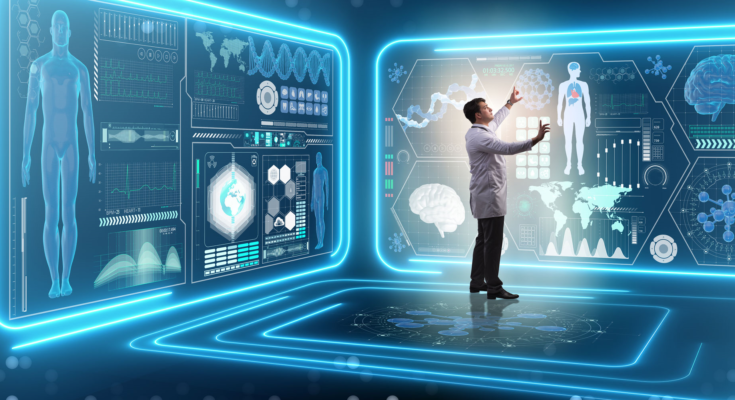Imagine a future where treatments are tailor-made for each individual, right down to their unique genetic makeup. That future is rapidly approaching, thanks to the incredible advancements in artificial intelligence (AI). Healthcare professionals, tech enthusiasts, and the general public alike are fascinated by how AI is poised to transform the landscape of personalized medicine. From optimizing treatment plans to predicting disease risk, AI is truly a game changer in the realm of healthcare.
In this blog post, we’ll explore the various ways AI is making personalized medicine more accessible and effective. We’ll discuss the current applications, benefits, challenges, and future prospects of AI in this exciting field. By the end of this article, you’ll have a comprehensive understanding of the pivotal role AI plays in personalized healthcare.
Understanding Personalized Medicine
Personalized medicine, also known as precision medicine, is an innovative approach that tailors medical treatment to the individual characteristics of each patient. This includes factors like genetics, lifestyle, and environment. Unlike the one-size-fits-all model of traditional medicine, personalized medicine aims to provide more accurate diagnoses and effective treatments.
The Intersection of AI and Personalized Medicine
AI brings a level of sophistication and accuracy that was previously unimaginable. By analyzing vast amounts of data, AI can identify patterns and make predictions that human practitioners might miss. This intersection of AI and personalized medicine is creating new opportunities for more precise and effective healthcare solutions. Let’s delve into some of the specific applications of AI in personalized medicine.
1. Disease Diagnosis and Risk Prediction
AI algorithms can analyze a patient’s medical history, genetic information, lifestyle factors, and environmental data to identify potential health risks or diagnose diseases at an early stage. This not only saves time and resources but also increases the chances of successful treatment.
Moreover, AI-powered risk prediction models can alert healthcare professionals about patients who are more likely to develop certain diseases based on their genetic predispositions. This allows for proactive measures to prevent or mitigate the impact of these diseases.
2. Treatment Optimization
One major challenge in healthcare is determining the most effective treatment plan for each patient. With the help of AI, doctors can analyze vast amounts of data to determine the best treatment strategies for individual patients. This includes personalized medication dosages and combinations, as well as recommendations for lifestyle changes.
3. Drug Discovery
Developing new drugs is a lengthy and costly process, with many potential treatments failing before reaching clinical trials. With AI-powered drug discovery, researchers can analyze vast databases of genetic information and medical research to identify potential drug targets more quickly and accurately. This reduces the time and resources needed for drug development, ultimately leading to faster access to new treatments.
Benefits of AI in Personalized Medicine
The use of AI in personalized medicine offers numerous benefits for both patients and healthcare providers. Some of the key advantages include:
- Improved Accuracy: By analyzing large datasets and identifying patterns, AI can make more precise diagnoses and treatment recommendations.
- Efficiency: With the help of AI, healthcare professionals can process and interpret vast amounts of data quickly, leading to more efficient decision-making.
- Cost Reduction: By optimizing treatment plans and reducing the need for trial-and-error approaches, AI can potentially lower healthcare costs in the long run.
AI in Genomic Profiling
One of the most promising applications of AI in medicine is genomic profiling. AI algorithms can analyze genetic data to identify mutations and variations that may contribute to diseases. This information can then be used to develop targeted therapies, increasing the likelihood of successful outcomes.
Enhancing Diagnostic Accuracy
AI-powered diagnostic tools are revolutionizing how diseases are detected. Machine learning algorithms can sift through medical images, lab results, and patient histories to identify early signs of conditions like cancer, diabetes, and cardiovascular diseases. These tools can often detect abnormalities that are invisible to the human eye. This leads to earlier detection and more accurate diagnoses, ultimately resulting in better treatment outcomes. AI can also assist in predicting an individual’s risk of developing hereditary diseases, allowing for preventative measures to be taken.
Optimizing Treatment Plans
AI can also help in crafting personalized treatment plans. By analyzing data from various sources, AI systems can recommend the most effective treatments based on an individual’s specific condition and genetic makeup. This not only improves outcomes but also minimizes potential side effects.
Predicting Disease Risk
Predictive analytics is another powerful application of AI in personalized medicine. By analyzing genetic, environmental, and lifestyle data, AI can predict an individual’s risk of developing certain diseases. This allows for early intervention and preventive measures, significantly improving patient outcomes.
AI in Drug Development
The pharmaceutical industry is also benefiting from AI. Traditional drug development is time-consuming and expensive, but AI can streamline this process. By analyzing biological data, AI can identify potential drug candidates and predict their effectiveness, speeding up the development of new treatments. This has the potential to greatly improve global healthcare outcomes.
Real-World Examples
Several healthcare institutions and tech companies are already harnessing the power of AI in personalized medicine. For instance, IBM Watson Health uses AI to analyze large datasets and provide treatment recommendations. Similarly, Google’s DeepMind is working on AI algorithms to predict patient outcomes in hospitals. These and other examples demonstrate how AI is transforming the healthcare landscape.
Benefits of AI in Personalized Medicine
The advantages of integrating AI into personalized medicine are manifold. AI enhances diagnostic accuracy, optimizes treatment plans, and enables early detection of diseases. It also streamlines drug development and provides insights that can lead to groundbreaking treatments. In summary, AI has the potential to revolutionize healthcare.
Ethical Considerations
While the benefits are significant, it’s essential to consider the ethical implications of using AI in healthcare. Issues like data privacy, algorithmic bias, and transparency need to be addressed to ensure that AI is used responsibly and ethically. Further research and regulations are needed to mitigate these concerns.
Challenges and Limitations
Despite its potential, the integration of AI in personalized medicine faces several challenges. These include data quality and availability, the complexity of algorithms, and the need for regulatory frameworks. Addressing these challenges is crucial for the successful implementation of AI in healthcare.
The Future of AI in Personalized Medicine
The future looks promising for AI and personalized medicine. Advances in technology will likely lead to even more sophisticated algorithms and applications. From real-time health monitoring to fully personalized treatment regimens, the possibilities are endless. With continued research and development, AI is set to be the ultimate game changer in personalized medicine.
Conclusion
AI is undeniably a game changer in personalized medicine, offering unprecedented opportunities for more precise, effective, and individualized healthcare. While challenges and ethical considerations remain, the benefits far outweigh the drawbacks. As technology continues to evolve, the role of AI in personalized medicine will only become more integral.
For those interested in exploring this fascinating field further, numerous resources and professional consultations are available. Don’t miss out on the opportunity to be part of this medical revolution.
Read also : PCOS and High Testosterone: How Polycystic Ovary Syndrome Affects Hormone Levels




